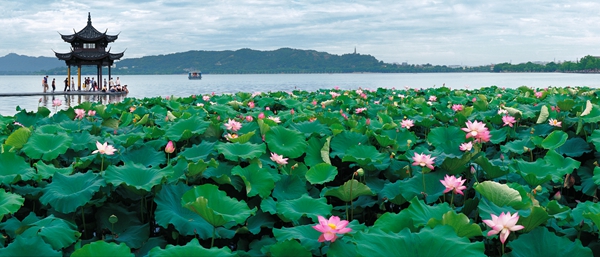Hangzhou Poised to Embrace the World – An Interview with Hangzhou Tourism Commission Director Li Hong
China Today, February 8, 2017 Adjust font size:

West Lake. Yu Guangming
The development of a tourist city can’t rely solely on the admission fees of its tourist attractions. By opening it to the public for free, the West Lake is naturally integrated into the city without boundaries, despite the loss of tens of millions of yuan in ticket proceeds. Tourists feel more comfortable and satisfied with the city’s natural wonders, and would like to stay longer.
With the increasing influx of tourists, their spending is also on the rise, thus greatly raising Hangzhou’s overall revenue in its tourism and leisure industry. In fact, free admission to the West Lake spurred an exponential increase in Hangzhou’s tourism revenue. In 2014, the overall income of its tourist industry stood at RMB 41.07 billion which surged to RMB 220.07 billion in 2015. So freeing the West Lake to all is beneficial to all sides.
The West Lake is a national 5A tourist attraction and also a UNESCO World Heritage Site. For most of the attractions adjacent to the lake, we abolished tickets. But for some spots, such as Lingyin Temple, Yue Fei Temple, and three pagodas on the island in the middle of the lake, we set up ticket gates to control the visitor flows. However, admission to all seven major parks along the bank and all museums is free.
CT: Hangzhou is also nicknamed “capital of e-business” in China. How has the city realized its Internet Plus pertaining to its tourist industry?
Li: At the 2016 China New-type Smart City Summit held in Beijing on December 27, Hangzhou led the list of the overall index on social services for Chinese cities, and also topped the indexes on new-type services for the public and transport services.
Hangzhou Tourism Commission has introduced an array of campaigns by resorting to new media. We established the official accounts in Facebook and Twitter, and also developed our own app in several languages.
In addition, cooperating with Alibaba, we introduced the Hangzhou Travel Passport program. With its online service, tourists can check tourism information, book related travel products, spot special offers, and find navigable maps and other services such as car rentals.
Tourists can make quick payments through Alipay. Moreover, we’re planning to collect and analyze data on visitors’ passports so as to more accurately target tourists in our travel product development and marketing.